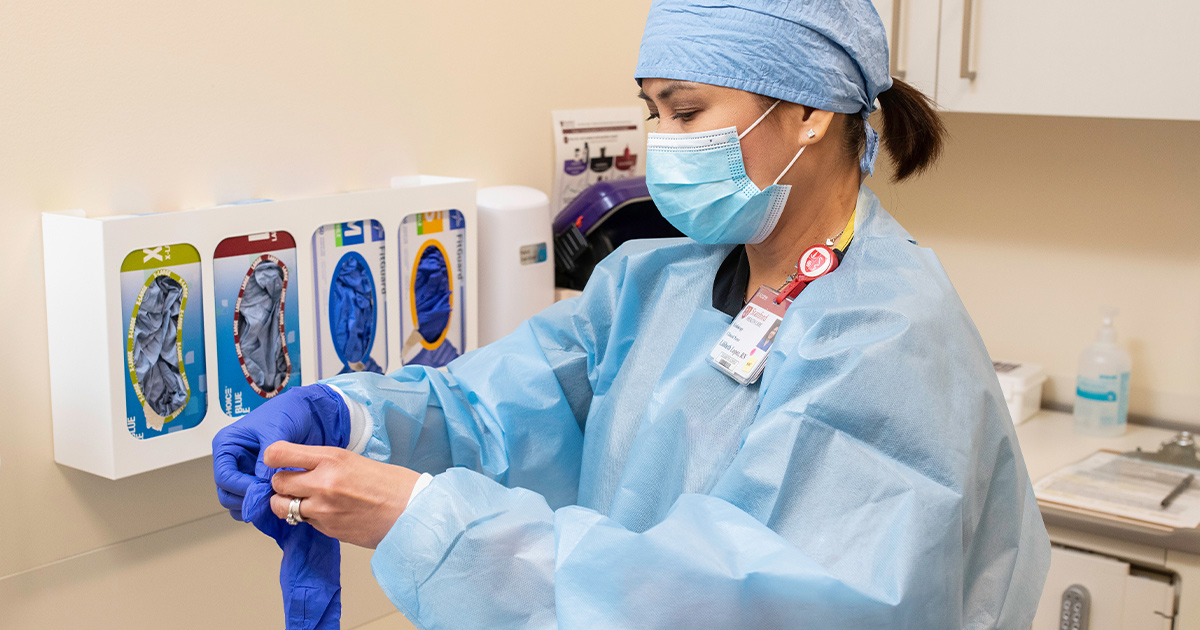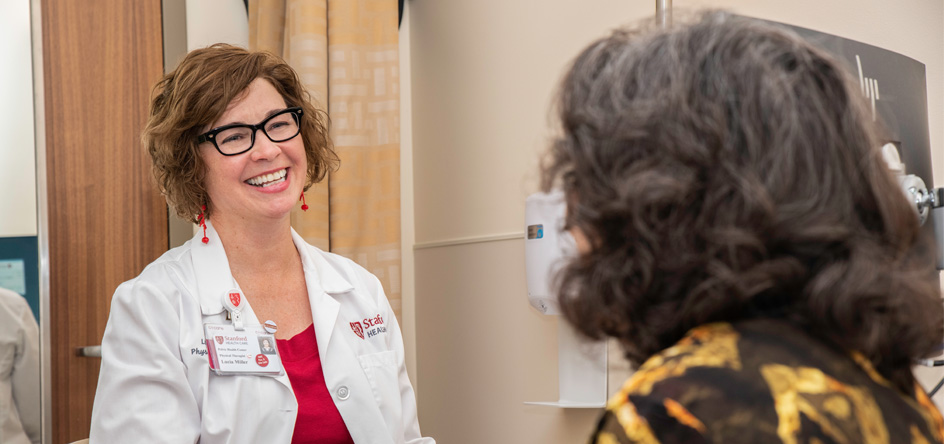Pelvic Health Center
Part of Digestive Health Center
Leaders in Treating Female and Male Pelvic Disorders
The Stanford Pelvic Health Center delivers comprehensive and compassionate care to treat all pelvic disorders. Our program is one of a few in the US with experts from over seven different specialties who collaborate closely to develop a care plan tailored to your specific needs.
420 Broadway Street, Pavilion D, 2nd Floor
Redwood City,
CA
94063
Phone: 650-721-2700
What We Offer You for PELVIC HEALTH CARE
- Specialized expertise in diagnosing and treating the physical, emotional, and social issues of routine and complex pelvic disorders. Go to Conditions Treated
- Treatment options, including medications, physcial therapy, surgery, and dedicated services to help you make lifestyle changes that may be critical to your pelvic health. Go to Treatments
- Clinical trials studying the latest advances that may not be available yet elsewhere to help manage pelvic health. Go to Clinical Trials
- Team-based care that brings together pelvic health specialists, physical therapists, and other leading experts to create a plan tailored to your needs. Go to Your Care Team
- Complete support services to help you focus on your total health and wellness. Go to Support Services
- Easy access to a broad range of pelvic health specialties and support services at one convenient location. Go to Accessing Care
Pelvic disorders, such as incontinence and pelvic organ prolapse, are common conditions that can have a major impact on your daily life. These conditions increasingly affect both women and men as they age. But pelvic disorders often go unreported.
The Pelvic Health Center care team, including urologists, gynecologists, gastroenterologists, surgeons, physical therapists, and others, work side by side every day to understand and bring together the right care for your unique needs.
Our patient-centered and compassionate specialists diagnose and treat all routine and complex problems with pelvic function.
Urinary conditions
- Urinary incontinence, or the inability to control urination.
- Overactive bladder, characterized by strong, sudden urges to urinate during the day and night.
- Urinary retention, or the inability to empty the bladder.
Pelvic structure conditions
- Pelvic floor dysfunction, such as pain or pressure, caused by a condition in the pelvic floor muscles and ligaments.
- Pelvic organ prolapse (POP), which occurs when an organ such as your bladder drops from its normal position through the opening of the vagina or rectum.
- Pelvic floor dyssynergia, occurring when muscles in your pelvic floor do not relax, making it difficult to have a bowel movement and resulting in constipation.
Genital conditions
- Genital organ prolapse, which occurs when genital organs drop from their normal position.
- Genital tract fistula, an abnormal opening in the genital tract.
Anal conditions
- Rectal prolapse, which occurs when part of the large intestine slips from the anus.
- Anal pain or spasms.
- Fecal incontinence, or the inability to control bowel movements.
- Incomplete defecation, or the inability to have a complete bowel movement.
For all your needs, no matter how common or complex, our specialists collaborate closely to develop precisely the right care plan for you. Every member of our team is devoted to offering you the most effective care based on the latest scientific evidence, in many cases, using today’s leading diagnostic and treatment approaches discovered and developed in our very own research programs.
INNOVATION HIGHLIGHTS
Multi-specialty coordinated care: All specialists work together under one roof at the Stanford Pelvic Health Center. Having gynecologists, urologists, gastroenterologists, and surgeons – plus specially trained nurses, physical therapists, nutritionists, and other professionals – working side by side enables us to make sure you get complete health care for any pelvic disorder.
Tips for pelvic health at every age
How to Improve Your Pelvic Health
ADVANCED DIAGNOSTICS
We understand the impact of pelvic disorders on your daily life. Our team is dedicated to helping you get back to living on your terms. We use the most advanced tools to pinpoint the cause of your condition and start you on the best care path. Our approaches include:
- Bladder ultrasound, the use of high-frequency sound waves to make images of your bladder
- Anal ultrasound, which is imaging of the anus
- Urinalysis, testing of your urine
- Laparoscopy, which uses a fiberoptic instrument to insert a scope to view internal organs
- Anoscopy, examination of the anus and lower intestine using a short, lighted tube called an anoscope
- Cystoscopy
- Urodynamic testing, a study of bladder and urethra function
- Anal rectal monometry, a test of muscle tone of the anus and sphincter
- X-rays
- Defecography, an X-ray test that shows the rectum and anal canal as they change during a bowel movement
- Blood tests
- Whole gut transit testing to measure the movement of food through stomach and bowel
TREATMENTS
Your care team will assess your unique needs and lifestyle to develop the best treatment plan for you. We may use a single approach or combination to provide you with the most comprehensive and personalized care possible.
Lifestyle changes
Our specially trained nurses and nutritionists work with you on behavior modification programs. The goal is to develop and maintain healthy lifestyle habits that help manage incontinence and other symptoms of pelvic disorders. Lifestyle-focused programs may include:
- Changes in your diet
- Changes in your environment
- Relaxation exercises specifically for pelvic conditions
- Programs to help you stop smoking
Therapy options
- Physical therapy to strengthen pelvic muscles with exercises
- Biofeedback therapy to help you see patterns of activity in your pelvic floor and train your mind to control body functions
- Relaxation therapy to help relieve pelvic muscle spasms and pain
- Acupuncture therapy to treat pelvic pain
Medical devices
- Neuromodulation: One technology that may help change your urinary behavior is neuromodulation. This non-surgical approach stimulates nerves running from the bladder to the brain. As a result, your bladder may be able to store more urine before your brain signals an urgent need to urinate. Another form of neuromodulation is designed to help treat bowel control problems.
- Eclipse vaginal insert: An eclipse vaginal insert is a discreet pump used to treat fecal incontinence. Once inserted into the vagina and inflated, the device presses against the rectum preventing the leakage of stool.
- Pessary: A pessary is a conservative alternative to surgical repair for pelvic organ prolapse (POP). As a small disc that is inserted into the vagina to support the uterus, a pessary may provide a helpful option to women who are not good candidates for surgery. Other types of pessaries are used to treat accidental bowel leakage and other conditions.
Medication
Your doctor may prescribe medications to treat your pelvic condition. Common options include:
- Ovulation inhibitors to block women from ovulating
- Treatments for constipation
- Treatments for diarrhea
- Anti-inflammatory medications to reduce swelling and tenderness
- Medications to reduce pelvic pain
- Bladder relaxants to treat urinary incontinence
In-office procedures
Depending on your needs, our doctors may be able to provide your treatment right in the office, with options such as:
- Botulinum toxin (such as Botox®), injected in pelvic floor muscles to help them relax and work properly
- Collagen-like “bulking agents,” injected to treat stress urinary incontinence
- Rubber band ligation for treatment of hemorrhoids
Surgery
Some pelvic disorders result from structural issues where surgical treatment is the best option. The experts on our team excel at all surgical techniques but always emphasize the least invasive approach, such as laparoscopy and robotic surgery, whenever possible.
Other surgical procedures performed at the center include:
- Hemorrhoid surgery, including doppler assisted hemorrhoid artery ligation
- Fistula repairs of holes in your bladder, vagina or rectum and surrounding organs
- Sphincter repair, sometimes called a “sphincteroplasty”
- Prolapse correction
- Colostomy , ileostomy or urostomy, where urine or feces goes into a bag worn on the body
- Vaginal laser surgery to relieve dryness or pain
- Pelvic reconstructive surgery
Clinical Trials
Our specialists deepen the understanding of pelvic health care through research and clinical trials. These studies evaluate new medical techniques, devices, and drugs to diagnose, treat, or prevent pelvic conditions. As a Stanford Health Care patient, you have access to these exciting new approaches.
Open trials refer to studies currently recruiting participants or that may recruit participants in the near future. Closed trials are not currently enrolling, but similar studies may open in the future.
Your Care Team
At our state-of-the-art center, you have access to a team of specialists, so we can offer you complete care for any pelvic health condition. Team members include:

Your Doctors
Colorectal Surgeon
Colorectal surgeons treat conditions including colorectal cancer, inflammatory bowel disease, diverticular disease, polyposis syndromes, and problems of the anus or rectum. They also treat pelvic floor disorders such as rectal prolapse. The Stanford Health Care colorectal surgery team has advanced expertise in all diagnostic and treatment approaches, emphasizing minimally invasive procedures whenever possible.
View All {0} Colorectal SurgeonsPelvic Reconstructive Surgeon
Stanford Health Care pelvic reconstructive surgeons offer leading-edge treatment options for all female and male pelvic conditions. Our specialists emphasize minimally invasive approaches, such as uterine-sparing reconstructive surgery for complex pelvic floor disorders, and perform the full range of surgical techniques as needed.
View All {0} Pelvic Reconstructive SurgeonsGastroenterologist
Gastroenterologists specialize in diagnosing and managing digestive disorders. Stanford Health Care gastroenterologists have extensive expertise in both common and complex disorders. They also lead pioneering research programs to discover new advances to detect, treat, and prevent digestive problems.
View All {0} GastroenterologistsUrologist
Urologists focus on diagnosing and treating conditions that affect the urinary tract and male reproductive organs. Stanford Health Care urologists provide general care as well as specialized expertise, making us a center for referrals from other doctors worldwide.
View All {0} UrologistsObstetrician And Gynecologist (OB-GYN)
Obstetricians specialize in pregnancy and childbirth. At Stanford Health Care, our dedicated experts support you throughout every phase of pregnancy, from planning to follow-up care.
Stanford Health Care gynecologists, specialists in the health of the female reproductive system, offer routine care as well as leading-edge diagnostic and treatment options for complex conditions such as pelvic floor disorders. Our specialists emphasize minimally invasive, uterine-sparing reconstructive surgery whenever appropriate.
View All {0} Obstetrician And Gynecologist (OB-GYN)sPain Management Specialist
Stanford Health Care anesthesiologists are dedicated to the relief of pain and the care of our patients during surgical and invasive diagnostic procedures. Our anesthesiologists provide a full range of services, including specialized care for pelvic conditions such as obstetric anesthesia and management of high-risk pregnancies.
View All {0} Pain Management SpecialistsNurse Practitioner
Nurse practitioners (NPs) are registered nurses (RNs) who have advanced education and clinical training. They can perform physical exams, diagnose and treat health problems, order lab work and X-rays, prescribe medicines, and provide health information.
View All {0} Nurse PractitionersStanford is an Academic Medical Center, which is a type of hospital setting where doctors teach the entire spectrum of medical education. Students range from beginning medical students to fully licensed and practicing doctors completing advanced sub-specialty training. Stanford Medicine is a partnership between Stanford University School of Medicine and Stanford Health Care. Since Stanford is a teaching hospital, you can expect to meet many providers and providers in training.
- Attending Physician: a doctor who supervises doctors in training or in medical school
- Fellow: a doctor doing postgraduate level work and specializing in care of patients with specific conditions
- Resident: a doctor who has graduated from medical school and is in training (also called “residency”) here at Stanford. A resident is also called an intern
- Medical Student: a student who is currently enrolled in medical school with the goal of becoming a doctor

Extended Care Team
In addition to our doctors, who are leading specialists in pelvic disorders, your care team at the Pelvic Health Center may include other specially trained professionals:
Physical therapists are experts in assessing the neuromusculoskeletal system which includes the pelvis. Pelvic floor physical therapists specialize in treating disorders of the pelvic floor muscles, joints, nerves and organs to help improve function and quality of life. Treatment may include manual therapy techniques, pelvic floor exercises, and biofeedback or electrical stimulation to improve the function of your pelvic floor, bladder, and bowel.
PHYSICAL THERAPISTS

Our nutrition experts are specially trained in pelvic health and can help you make food choices appropriate to your condition.
Nurses provide one-on-one support throughout your care journey. They help you navigate from your first contact with us to follow-up care, assessing your needs, answering your questions, making referrals, coordinating appointments, and providing education.
Care coordinators provide you with information and assistance prior to and during your appointment.
- Medical Assistant–Medical assistants bring you to your exam room after you check in for your appointments. They take your vital signs before your doctor sees you.
- New Patient Coordinator–Our coordinators contact you before your first appointment and help you prepare by providing the information you need to know and bring with you.
- Patient Access Representative–Our patient access representatives greet you at the front desk and register you for your appointments.
If you qualify for a clinical trial, our research coordinators guide you through the process. They educate you about what to expect during the study, answer your questions, and schedule your appointments.

Support Services
We take care of the details, so you can focus on your health and wellness. Our pelvic health specialists work as a team to coordinate every aspect of your care. We also offer a wide range of support services to promote healing and improve your quality of life:
In addition to the best care for your unique needs, the Pelvic Health Center offers you convenience and easy access. All our services are available at one centralized location.
Please fill out the New Patient Form (PDF) for your first appointment.
Frequently Asked Questions
We participate in a wide range of insurance plans. View the list of insurance plans accepted by Stanford Health Care »
Have insurance or pre-authorization questions? The Patient Financial Clearance team is available Monday – Friday, 8 a.m. – 5 p.m., to answer your questions. Please call 650-724-4445 or 1-877-291-7335
When choosing a doctor, it’s important to consider the doctor’s clinical training, experience, and expertise in a specialized area that matches your health care needs.
You can find the right Stanford doctor for you by using our doctor directory and filtering the results based on a medical category, specialty, or doctor’s last name. View a list of our pelvic health specialists
Support services include a service unique to our center: onsite physical therapy with biofeedback that helps people train their minds to control body functions. We also offer financial counseling, interpreter and translation services, and more.
You can call the center directly at 650-721-2700.
Yes, Stanford Health Care offers financial assistance for patients who are uninsured or underinsured. Meet with one of our financial counselors to find the best approach to paying for your health care. Financial counselors are available Monday through Friday from 7:00 a.m. – 6:00 p.m. Learn more about financial assistance services »
Managing pelvic health is a personalized process. Our team guides you every step of the way. To help you prepare for your first appointment:
- Review maps, directions, parking, public transit options, and contact information for the Pelvic Health Center.
- Note any questions you wish to ask your care team.
For your first appointment, you should plan to bring any related test results and your medical history to share with your doctor. Our team will confirm the information you should bring with you before your first appointment.
You will also need to have the following information with you when you check in:
- New Patient Questionnaire (PDF)
- Insurance card
- A form of payment for any co-pays or deductibles
One of the following forms of photo ID:
- Valid state-issued driver’s license
- Valid state-issued ID card
- Valid passport
- Valid U.S. Military ID card
- Valid U.S. Permanent Resident Card
Please see Directions and Parking Information. Please allow enough time to make sure you arrive on time for your appointment.
Please print, fill out, and return the Medical Record Release Form to your new patient coordinator. The medical release form is an authorization form for external facilities to release medical records to Stanford Health Care.
Always feel free to bring someone with you to your appointments. A family member or friend can help ask questions, remember the information your care team gives you, and provide support.
Yes. However, by California state law, you must let your care team know that you would like to record your conversation to help you remember the discussion later.
Write down your questions before your appointment and rank them in order of importance, beginning with the most important ones. If there isn’t enough time to have all your questions answered during your appointment, ask your doctor who you can speak with to get your other questions answered.
Yes, please visit International Services.
Support resources include financial counseling, interpreter services, and more. The specialists at the Pelvic Health Center can help you get the resources you need.
If you need to cancel or change your appointment, please call us as soon as possible, at least 24 hours in advance.
Our receptionists at the Pelvic Health Center are available Monday through Friday, 8 a.m. to 5 p.m. to help you reschedule or cancel your appointment. Please call 650-721-2700.
To determine if a clinical trial is right for you, talk to your doctor. He or she can refer you to a research coordinator for more information on studies that may be right for your specific condition.
You can also find the guidelines for who can participate in a particular clinical trial online. However, it is best to work with your doctor to decide the right care approach for your needs.
View list of open pelvic health clinical trials at Stanford
You have multiple options when it comes to paying your bill.
- Pay Online:
- You can log in to MyHealth or the MyHealth mobile app to see and pay your bill.
Already have an account but need help logging in?
Contact the MyHealth Help Desk
- You can also pay as a guest to pay your bill without logging in.
- Pay by mail:
- Stanford Health Care
P.O. Box 740715, Los Angeles, CA 90074-0715
Los Angeles, CA 90074-0715
- Stanford Health Care
- Pay by Phone:
- You can call our Patient Billing Customer Service Office
1-800-549-3720.
- You can call our Patient Billing Customer Service Office
For our latest business hours and for more information about billing, visit our Billing page.
Our International Medicine Services team can help you find the right doctor, estimate medical costs, book travel, and get you information about Stanford programs and services.
Please call +1 650-723-8561 or email IMS@stanfordheatlhcare.org to get started.
For Referring Physicians
PHYSICIAN HELPLINE
Fax: 650-320-9443
Monday–Friday, 8 a.m.–5 p.m.
Stanford Health Care provides comprehensive services to refer and track patients, as well as the latest information and news for physicians and office staff. For help with all referral needs and questions, visit Referral Information.
You may also submit a web referral or complete a referral form and fax it to 650-320-9443 or email the Referral Center at ReferralCenter@stanfordhealthcare.org.
HOW TO REFER
Fax a referral form with supporting documentation to 650-320-9443.
 Pelvic Health Center
Pelvic Health Center








